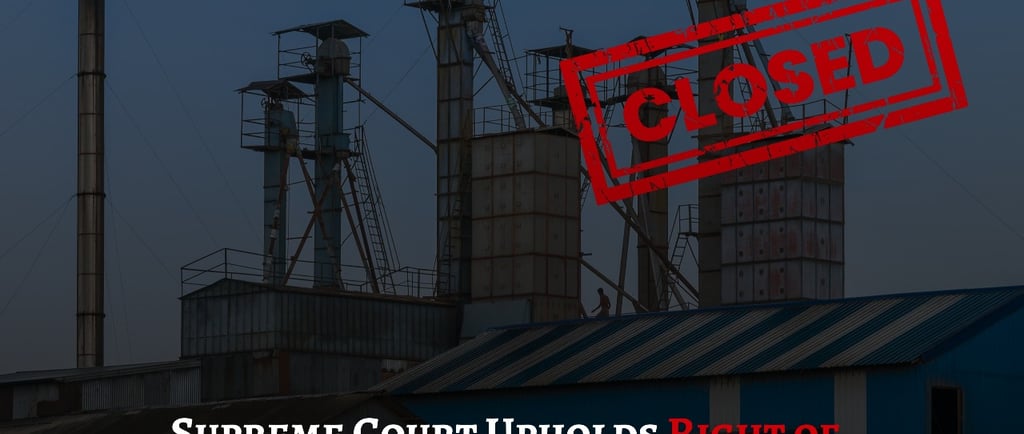Supreme Court Upholds Right of Harinagar Sugar Mills to Shut Down Biscuit Division: Holds Closure Permission Was ‘Deemed Granted’
In a landmark ruling delivered on June 4, 2025, the Supreme Court of India allowed the appeals of Harinagar Sugar Mills Ltd. (Biscuit Division) against the State of Maharashtra, holding that the closure of its biscuit manufacturing unit was deemed to have been permitted under Section 25-O(3) of the Industrial Disputes Act, 1947. The apex court ruled that the State’s failure to pass a reasoned order within the statutorily mandated 60-day period entitled the company to shut down the unit legally, thereby setting aside the Bombay High Court’s judgment that had ruled otherwise.
6/18/20253 min read


Harinagar Sugar Mills Ltd. (HSML), a contract manufacturer for Britannia Industries Ltd. (BIL), had been producing biscuits exclusively for BIL for over three decades. This arrangement was governed by a Job Work Agreement (JWA), which was renewed multiple times until BIL issued a termination notice on May 24, 2019, with effect from November 27, 2019.
Following this termination, HSML filed an application on August 28, 2019, under Section 25-O(1) of the Industrial Disputes Act seeking permission to close its Biscuit Division, which employed 178 permanent workers. The State of Maharashtra, through a letter dated September 25, 2019, rejected the application on grounds of incompleteness and directed the company to resubmit with further details, particularly efforts made to prevent closure.
Subsequent correspondence and notices ensued, including further requests from the State on November 4 and meetings scheduled for November 26, just a day before the intended closure. The workers’ union also challenged the closure before the Industrial Tribunal and obtained an interim stay. HSML, however, maintained that the application was complete and the State’s inaction within 60 days triggered deemed approval under the law.
Supreme Court's Observations:
The bench comprising Justices Sanjay Karol and Prashant Kumar Mishra delivered a meticulous judgment dissecting the procedural requirements under Section 25-O of the Industrial Disputes Act.
Deemed Closure and Government Inaction:
The Court found that the State Government, particularly the Minister for Labour, had not passed any valid order rejecting or accepting the closure application within the stipulated 60 days. The letter dated September 25, 2019, issued by the Deputy Secretary, was held to be unauthorised since there was no formal notification under Section 39 of the Act empowering the Deputy Secretary to act as the appropriate government.
Non-application of Mind:
The Court refused to accept internal file notings or endorsements as substitutes for reasoned orders from the competent authority. Referring to precedents including Bachhittar Singh v. State of Punjab and Sethi Auto Services v. DDA, it reiterated that internal notings do not constitute official orders unless formally communicated. Merely forwarding directions on the file without independent application of mind by the competent authority — in this case, the Minister — was inadequate.
Failure to Adhere to Procedural Requirements:
The Court noted that Section 25-O(2) requires the appropriate government to make an inquiry, provide a hearing to all stakeholders, and pass a reasoned order. Since none of these steps were fulfilled within 60 days, the closure stood “deemed approved” under Section 25-O(3). The judgment criticized the High Court for erroneously relying on the wrong statutory form (Form XXIV instead of XXIV-C), leading to a misinterpretation of the application’s completeness.
On Efforts to Avoid Closure:
HSML had submitted further documentation on October 10, 2019, explaining how it approached other potential clients like Mondelez, ITC, and Parle, but none offered alternate manufacturing work. This, the Court held, demonstrated that the company had genuinely attempted to continue operations but was left with no viable options.
Interpretation of Section 25-O:
The Court, while balancing the employer’s right under Article 19(1)(g) of the Constitution and the protection of workers under industrial law, cited Excel Wear v. Union of India and Orissa Textile & Steel v. State of Orissa to reaffirm that the right to close a business is a constitutional right, though subject to reasonable restrictions. It held that the amended Section 25-O meets constitutional muster and protects both employers’ and employees’ interests — provided procedural safeguards are respected.
Relief Granted and Final Directions:
Acknowledging that several employees would be rendered jobless, the Court took note of a gesture made by HSML, which had already deposited ₹4 crores and offered another ₹10 crores towards compensation. The Court further directed that an additional ₹5 crores be paid, making it a total of ₹15 crores to be disbursed among eligible employees, in addition to their statutory gratuity.
Significance of the Judgment:
This ruling is significant for industrial jurisprudence as it underscores:
The sanctity of procedural timelines under labour law;
The limits of executive discretion without statutory authority;
The reaffirmation that deemed closure provisions are legally enforceable when government inaction occurs;
The balance between an employer’s right to close operations and the welfare of workers.
By setting aside the High Court’s judgment, the Supreme Court has reinforced the notion that while welfare of workers is a constitutional concern, procedural fairness and statutory compliance by the government cannot be compromised.
Reactions:
Legal experts have termed this a precedent-setting judgment for interpreting deemed closure provisions strictly in favor of procedural compliance. Labour unions, while disappointed, have welcomed the ₹15 crore relief as a form of compensation for the affected workers. HSML, through its counsel, expressed satisfaction with the outcome, stating that the company had no ill-intent and was merely exercising its statutory and constitutional rights.
